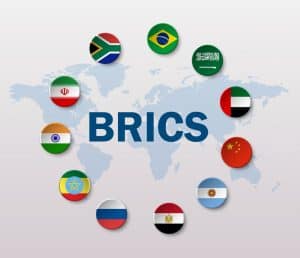BRICS has not only on-boarded several new countries, they have fifteen waiting in the wings, and another twenty-five who are interested.
June 10, 2024
By: Bobby Casey, Managing Director GWP

The G7 has not expanded its membership, in fact it’s contracted it as Russia used to be a member.
A sort of ants versus grasshoppers situation appears to be forming here. BRICS added Iran, Egypt, Ethiopia, and the United Arab Emirates in 2024. There are another fifteen countries who have applied this year: Algeria, Bahrain, Bangladesh, Belarus, Bolivia, Cuba, Kazakhstan, Kuwait, Pakistan, Senegal, Thailand, Venezuela, Vietnam, and Yemen.
RT points out:
The expanded BRICS makes up about 30% of the global economy and a population of around 3.5 billion, or 45% of the world’s total. It also accounts for over 40% of the world’s oil production.
According to the International Monetary Fund, BRICS currently accounts for as much as 36% of global GDP in terms of purchasing power parity (PPP), compared to just over 30% for the G7. BRICS aims to overtake the G7 in nominal global GDP over the next four years, the head of the New Development Bank (NDB), Dilma Rousseff, said in February.
There are another twenty-five countries who’ve expressed interest in joining the BRICS including Saudi Arabia. I only call them out because this is the same country who, after nearly forty-eight years, decided they are open to trading in currencies other than the US dollar.
China has been courting Saudi Arabia. Remember last November:
The People’s Bank of China (PBOC) and the Saudi Central Bank signed a three-year currency swap agreement worth Rmb50bn ($6.93bn) or SR26bn. According to a statement by the PBOC, the deal is designed to help the two countries strengthen their financial co-operation and boost the use of local currencies, while also promoting trade and investments.
It is also the country with the world’s largest oil and gas company, Aramco, who just partnered with Japanese financial services company, SBI Holdings, to collaborate “in the field of digital assets”.
Saudi Arabia is clearly keeping its options open.
Thailand is another country taking a similar strategic approach:
Finance Minister Thirachai Phuvanatnaranubala said last year that BRICS membership was an important way for Thailand to adjust to the shifting global balance of power. “Thailand must adjust its foreign relations strategy, lessening dependence on the USA but being cautious to avoid problems with the long-standing U.S. relationship,” The Nation paraphrased him as saying.
Thailand is caught between two superpowers: China and the US.
It needs the US investment and has a treaty agreement with them. But it also needs the trade and protection of China. Indonesia backed off of their bid on joining BRICS because they got a side-eye from the US, so Thailand knows it needs to walk a very fine line between the two.
As BRICS expands, with countries that are both known adversaries of the US along with known allies of the US, how will they move the money around.
China has the strongest currency in the group. And certainly it would love to serve as the reserve currency. But a singular currency between countries that have all seem to have trade agreements with China but none amongst the other member nations is rough. Furthermore, you’re dealing with developing and economically unstable countries. For them to all commit to upholding a universal currency standard would be challenging to say the least.
It’s highly unlikely that all the member nations will abandon their own currencies in favor of one universal one, and there still needs to be a PvP (Payment versus Payment) mechanism.
This is assuming they get past the biggest obstacle which is most transactions still happening in $ US dollars$ . BRICS countries such as Russia and Iran are already banned from using the USD. They don’t need to be “de-dollared”. But, without a bilateral trade agreement between each member country, they don’t have an intermediary currency to trade with the other member nations within coalition. Again, China would be happy to oblige here, but that is still years down the line.
There are two possible workarounds: Gold and Cryptocurrency.
Gold is also very viable:
As of Q1 2024, the combined central bank gold holdings of the original BRICS nations plus the five new additions accounted for nearly 17 percent of all the gold held in the world’s central banks. Russia, India and China rank in the top 10 for central bank gold holdings.
Maybe this is the final destination with crypto being the interim play? Nathan Lewis at Forbes believes BRICS is moving further down the path of all currencies being denominated in gold.
Blockchain technology and digital currency is the quickest option, and is rumored to be floating as a possible bridge solution.
Regardless of the path they take, the USD is looking at late-empire stage tumult. A lot of welfare, warfare, debt, and inflation leaves the current global reserve currency vulnerable, to say the least.
Given the share of gold and global GDP these countries have combined, the US and G7 countries in general, should watch their backs. If supposed allies are keeping their options open, confidence is clearly shaken.
Click here to get a copy of our offshore banking report, or here to become a member of our Insider program, where you are eligible for free consultations, deep discounts on corporate and trust services, plus a host of information about internationalizing your business, wealth and life.

